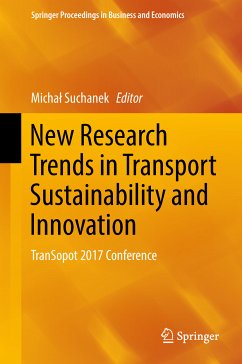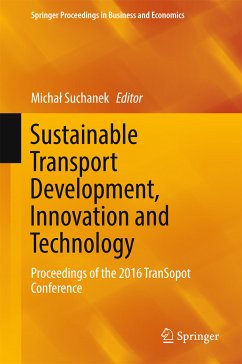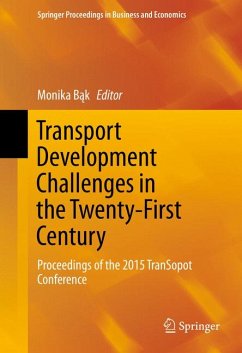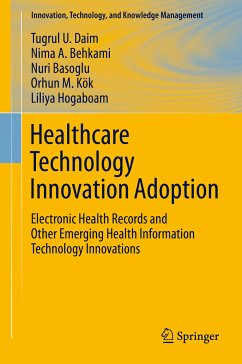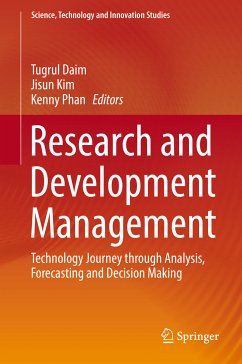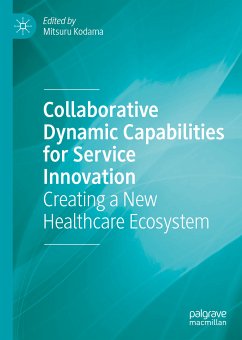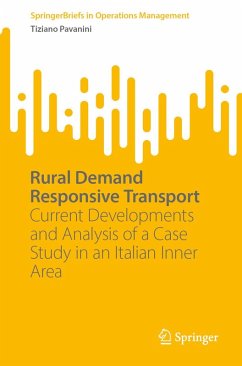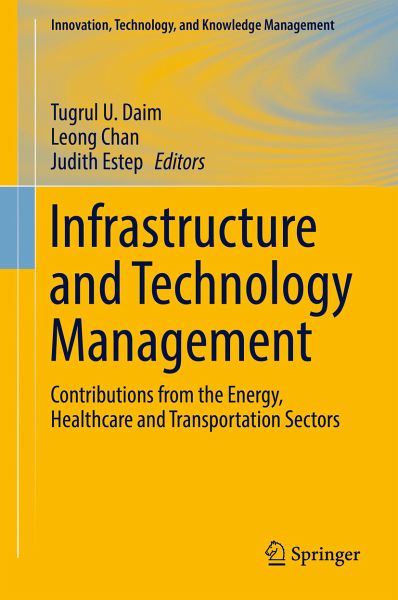
eBook, PDF
Infrastructure and Technology Management (eBook, PDF)
Contributions from the Energy, Healthcare and Transportation Sectors
Redaktion: Daim, Tugrul U.; Estep, Judith; Chan, Leong

PAYBACK Punkte
80 °P sammeln!





Presents emerging technology management approaches and applied cases from leading infrastructure sectors
Provides decision making frameworks that can be utilized by executives and government leaders
Examines key sectors such as energy, healthcare and transportation
Dieser Download kann aus rechtlichen Gründen nur mit Rechnungsadresse in A, B, BG, CY, CZ, D, DK, EW, E, FIN, F, GR, HR, H, IRL, I, LT, L, LR, M, NL, PL, P, R, S, SLO, SK ausgeliefert werden.
Tugrul Daim is a Professor and Director of the Technology Management Doctoral Program at Portland State University. Prior to joining PSU, he had worked at Intel Corporation for over a decade in varying management roles. At Intel he managed product and technology development. He also has several professional certifications including New Product Development Professional and Project Management Professional. Professor Daim has been consulting to several organizations in sectors ranging from energy to medical device manufacturing. He has been helping organizations including US Dept of Energy, Energy Trust of Oregon, Biotronik, Biopro, Elsevier and many others to develop technology roadmaps for their future investments. He is also a visiting professor with the Northern Institute of Technology at Technical University of Hamburg, Harburg where he teaches similar short courses. He has been recently appointed as Extraordinary Professor at the Graduate School of Technology Management at University of Pretoria in South Africa. He is frequently invited to give lectures to many multinational companies including IBM, Xerox and HP as well as universities around the world including his recent visits to Finland, Japan and Germany. He has published over 200 refereed papers in journals and conference proceedings. His papers appeared in Technological Forecasting and Social Change, Technovation, Technology Analysis and Strategic Management, Computers and Industrial Engineering, Journal of Medical Systems, Energy, Energy Policy and many others. He has coauthored four books of readings and several proceedings. He is the Editor-in-Chief of International Journal of Innovation and Technology Management and North American Editor of Technological Forecasting and Social Change. Leong Chan is an Assistant Professor of Business Management at Paci¿c Lutheran University, USA. He is a SAS certified professionalwith multiple credentials, including SAS certified advanced programmer and SAS Certified Statistical Business Analyst. He has various publications in forms of books, peer-reviewed journals, and international conference proceedings. His scholarship interests are in the areas of technology assessment, technology policy, R&D management, and business analytics. Judith Estep is the Acting Director in the Technology Innovation Office at the Bonneville Power Administration. Judith is a key part of the leadership team that guides BPA's highly successful Technology Innovation program. BPA spends 0.4% of revenue ($17 million annually) on technology innovation through a disciplined program of portfolio, project, and technology transfer / application management, guided by a publicly articulated research agenda embodied in technology roadmaps. www.bpa.gov/ti She joined BPA in November 2010 as the Project Management Officer in the Technology Innovation Office and was responsible for providing oversight and guidance to the Research and Development Project Managers as well as implementing Project Management Best Practices and process improvements. She moved into the role of Portfolio Manager in April 2016. She was responsible for establishing the research agenda, managing the annual solicitation, portfolio review, and developing and implementing process improvements, In addition, she managed an agency wide PMO working group that is responsible for centralizing project management communication and ensuring that a high quality and consistent training curriculum, specific to project management, is available to the Agency. Most recently she was promoted to be the Director of Research and Development.
Produktdetails
- Verlag: Springer International Publishing
- Seitenzahl: 498
- Erscheinungstermin: 10. Januar 2018
- Englisch
- ISBN-13: 9783319689876
- Artikelnr.: 52942842
Für dieses Produkt wurde noch keine Bewertung abgegeben. Wir würden uns sehr freuen, wenn du die erste Bewertung schreibst!
Eine Bewertung schreiben
Eine Bewertung schreiben
Andere Kunden interessierten sich für



